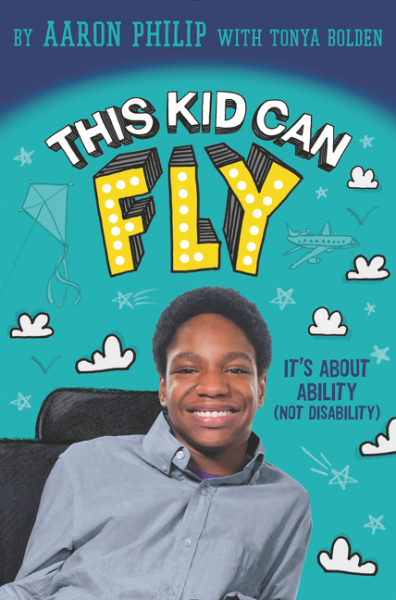This Kid Can Fly: It’s About Ability (Not Disability) by Aaron Philip, with Tonya Bolden.
Balzer + Bray imprint, HarperCollins, New York, 2016.
Middle grade autobiography, 179 pages.
Lexile: 880L .
AR Level: 5.8 (worth 4.0 points) .
Aaron (pronounced Ay-ron) Philip is an ordinary kid who became famous through his tumblr and drawings, which led him to become a disability activist.

I had never heard of Aaron Phillip before, so despite seeing this book in the store, I didn’t pick it up until I started my diverse disabled booklist. And it would have been a real loss if I hadn’t.
This story explores quite frankly and with age-appropriate language, how difficult poverty and discrimination can make access to resources. Imagine you are disabled and need to use a wheelchair to move around. Now imagine your apartment is on the fifth floor of a building with no elevator.
If someone gave you a special tricycle you could ride around the neighborhood, that would be great, right? Well, only if your father is able to disassemble, transport downstairs and reassemble, leave signs so it is not thrown away or taken, and then transport you downstairs. After a brain-building, emotion-lifting, muscle-stimulating ride that’s all too brief, the entire process has to be repeated in reverse order.
It’s amazing that this is in print at all.
I need to confess one of my own biases here. Having only read the blurb, I assumed that Aaron was adopted. However, his Antiguan family came to New York, and eventually stayed, because of his medical needs. They faced considerable pain because of this, including the separation of family as at least one member is always living elsewhere. At this point, Aaron has not seen his mother for several years, and the family is clinging desperately to the Antiguan home that is their last asset, even as his father has become a citizen so that he can work and access healthcare in America.
Aaron doesn’t talk much about race, only bringing it up once and stating in an aside that “being black in a mostly white school was the least of my problems – and really not a problem at all” (p. 70).
However, just being in that white school was a huge advantage. He was able to get a special exception to the district zoning thanks to his pre-K teacher Lori, who “didn’t think I could maximize my potential at any school in my district in the Bronx.” (p. 42) I don’t have much experience with special education, but based on the mainstream schools I’ve seen, getting out to a school in a more affluent area can be a life-changing experience.
There were challenges, and during those,
“many adults at my school just didn’t get it. Some of them made me feel like after all MSC had done for me, I should shut my trap. It made me wonder if the generosity was conditional. Would it only come if I put on a happy-camper face?” (p. 78).
Aaron loves his school and clearly benefits greatly from the environment there, but wouldn’t it have been even better if a school like this existed in his neighborhood too? One where siblings could attend too for a mainstream/special ed experience, with physical therapy rooms and aides for all students?
Chapter 17. Up until this point I had been enjoying the book, sticky notes dotted all the many pages that I thought had good quotes, but it wasn’t especially moving. Then at this point I found myself full-out crying. The reader moves from wishing the family could be reunited to suddenly having much, much bigger concerns.
Unlike Lion, this one doesn’t have an unequivocally happy ending, but it is still a good and inspirational tale of an immigrant family whose kid was able to thrive through luck, persistence, hard work, and sacrifices from the whole family. I strongly recommend this book to all upper elementary (grades 4-8) classrooms. There is nothing inappropriate that would prevent it being used with younger children as well if they are able to read it or if you want to use it as a family read-aloud. I’m considering it for our next non-fiction read-aloud. While the chapters are not all equal length, they are fairly short and break down nicely.
Read about Aaron’s life before his book. His physical therapist was suspended for assisting him with his Kickstarter. Watch that Kickstarter video here (project is over). Read an interview with Aaron and his coauthor from the Brown Bookshelf. Watch him speak at tumblr.
This is a new title to me, and sounds like such a great story – it can be so hard to find diverse disability narratives, including ones that feature economic diversity. As you say, the disability experience can vary so much based on outside forces, and it’s so important that these kinds of stories be told!
LikeLiked by 1 person
Yes, I’m hoping to find more books like this one, but for now I’ll settle for spreading the word about this book!
If you’re looking for more books about people of color or indigenous disabled people, I’ve started a list here. I’m also open to any suggestions or recommendations about books to add.
LikeLike
I have been searching for more disabled books for kids as there are so few! This one looks great! Thanks for sharing at the DiverseKidLit Linky!
LikeLiked by 1 person
I’m glad it looks good to you – we really enjoyed it! You can find more books about disabled kids from diverse cultures on my Diverse Disabled Booklist.
LikeLike